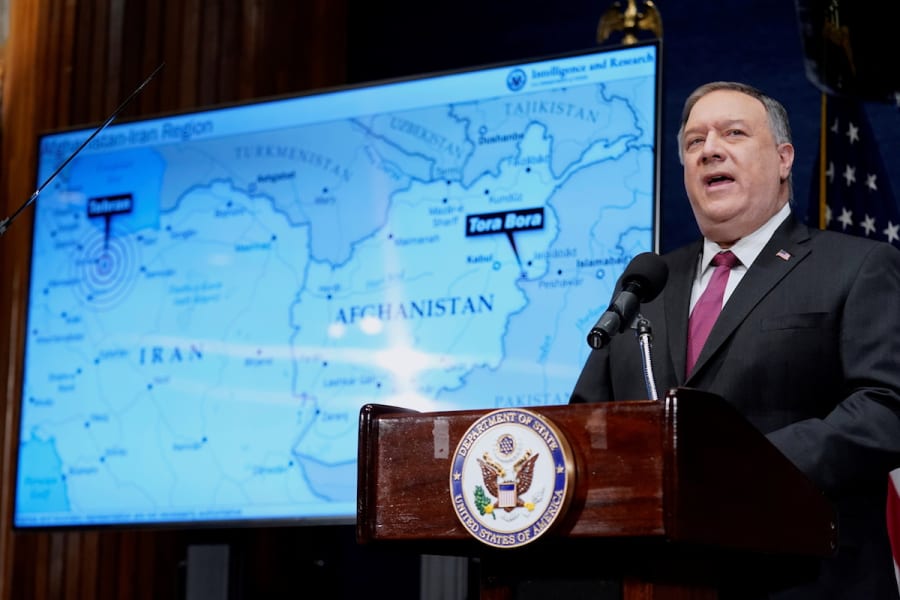From ‘maximum pressure’ to massive rollback of sanctions: The night-and-day difference between Biden and Trump’s approach to Iran
ALL ISRAEL NEWS reported last week that Biden approach appears as American "weakness"

During his four years as U.S. president, Donald Trump took a hardline approach toward Iran.
In 2018, he pulled America out of the nuclear deal and then implemented a maximum pressure campaign of heavy sanctions on the Islamic Republic in order to persuade them to curtail production of nuclear weapons. Trump even increased sanctions just before he left office.
And, his administration believed this approach was working. Former Secretary of State Mike Pompeo argued that U.S. sanctions succeeded in crippling the Islamic Republic.
“Iran’s economy faces a currency crisis, mounting public debt, and rising inflation,” he said in November. “The Iranian rial has depreciated to one fifth of its former value against the dollar since the start of the campaign, while Iran’s GDP has shrunk by around 6% for three consecutive years.”
Now the Biden administration appears to be reversing course.
The United States entered the nuclear deal – the Joint Comprehensive Plan of Action (JCPOA) – under former President Barack Obama in 2015 while Joe Biden was vice president.
During the presidential campaign, Biden vowed that he would return to the deal. And now it appears – more than ever – that he is making good on that promise.
News broke today that the administration is considering rolling back Trump’s stringent sanctions. Though the administration hasn’t said which sanctions would be removed, talks between the U.S. and Iran are continuing in Vienna, and American officials have hinted at their willingness to remove several sanctions, according to The Associated Press.
“Any return to the JCPOA would require sanctions relief, but we are considering removing only those sanctions that are inconsistent with the JCPOA,” State Department spokesman Ned Price said. “Even if we rejoin the JCPOA — which remains a hypothetical — we would retain and continue to implement sanctions on Iran for activities not covered by the JCPOA, including Iran’s missile proliferation, support for terrorism, and human rights abuses.”
The Biden administration contends that some of Trump’s sanctions were inconsistent with the terms of the JCPOA, although former Trump officials contend that they were approved by the justice department lawyers.
“As we have said, if Iran resumes its compliance with the nuclear deal ... we would be prepared to lift those sanctions that are inconsistent with the JCPOA,” Price said last week.
But just last week, Pompeo told ALL ISRAEL NEWS that Biden’s approach was perceived as weakness by the mullahs. And with the “same cast of characters” that served in the Obama administration, the Iranians have now increased uranium enrichment to 60% – dangerously close to “military, bomb-grade” levels.
“So, they have good reason to believe that they may be able to get precisely what they want,” Pompeo said, “which is no sanctions, the ability to conduct commerce around the world, the capacity and resources to conduct terror campaigns, whether that's through Hezbollah or the Iraqi militias, the Iranian-backed militias inside of Iraq.”
It has been estimated that Iran is just “two or three months” away from being able to build a nuclear bomb.
Perhaps sensing a more conciliatory approach from Biden, Tehran – which has violated the terms of the JCPOA – has threatened to continue its nuclear activities if sanctions are not eased.
This news that the U.S. might ease up on the regime now did not sit well with critics of the deal.
“The administration is looking to allow tens of billions of dollars into the coffers of the regime even if it means lifting sanctions on major entities blacklisted for terrorism and missile proliferation,” said Mark Dubowitz, CEO of the Foundation for Defense of Democracies. “They’re even looking to give the regime indirect access to the U.S. dollar through the U.S. financial system so that international companies can clear transactions with Iran through the U.S. dollar.”
Republicans are also outraged and may look to legislate the Trump sanctions. But there is also strong bipartisan support for a tough approach to Iran.
Today, 220 Democrat and Republican sponsors endorsed a similar resolution expressing support for a "non-nuclear" Iran in addition to supporting the Iranian people’s desire for democracy.
They demanded the administration recognize “the rights of the Iranian people and their struggle to establish a democratic, secular, and non-nuclear Republic of Iran while holding the ruling regime accountable for its destructive behavior.”
Also in February, Rep. Tom McClintock (R-CA) and Rep. Brad Sherman (D-CA) co-sponsored a resolution calling for a free and democratic Iran, while condemning its human rights violations.
They wrote to Biden urging that the United States “remain firm in holding the Iranian government accountable for its nuclear and other destabilizing activities in the region, such as its support for terrorism, development of ballistic missiles and human rights violations.”

Nicole Jansezian was the news editor and senior correspondent for ALL ISRAEL NEWS.













